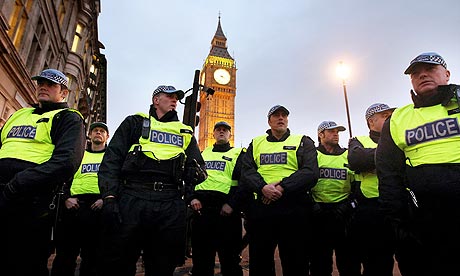 Guardian | Senior police officers are struggling to keep up with the UK's increasingly fast-paced and agile protest movement, according to a report by an official watchdog.
Guardian | Senior police officers are struggling to keep up with the UK's increasingly fast-paced and agile protest movement, according to a report by an official watchdog.The review points to groups such as UK Uncut, the Twitter-based campaign against tax avoidance, and the recent spate of student protests as evidence of a fast-evolving movement.
However, it reveals that by far the largest public order burden facing police forces, in terms of boots required on the ground, is demonstrations organised by the far-right English Defence League (EDL) campaign group.
Produced by Her Majesty's Inspectorate of Constabulary (HMIC), the report seeks to assess the extent to which police forces have changed their tactics in the aftermath of the Metropolitan police's controversial handling of the G20 protests in London. The HMIC called for wide-scale reform after the protests, which resulted in the death of a bystander, Ian Tomlinson.
While some forces have learned lessons, and the Association of Chief Police Officers has produced a new manual for public order policing, reforms are yet to filter down to training rank and file officers, the report says. "The pace of these changes can be measured in months, if not years. These timeframes may not, even then, include the additional time needed to train officers performing the key roles on the frontline, or in command," it states.
A "relatively quiet" era of protest is giving way to one that is "faster moving and more unpredictable", the report states. Reforms include the significant curtailment of police Forward Intelligence Teams (FITs), which photograph and film protesters, and more limited use of stop and search powers. But training has not been fully rolled out across the country and less than a third of commanders have learned the revised guidelines.
The chief inspector of constabulary, Sir Denis O'Connor, said there were signs of reform, but the "fast-changing character" of protest meant a need for renewed urgency. "We found lots of evidence of [police forces] changing things. They have changed the training, they have changed the guidance, they have done a lot of work on human rights," he said. He said police were looking at how they can use social media, including Twitter, and adapt British "toe to toe" public order policing.
"The world is changing, and it is requiring pretty rapid changes in policing, in the way we balance things in this democracy. The police are doing things – the question is can they do it quickly enough to keep up with the fast world we're all in."


0 comments:
Post a Comment